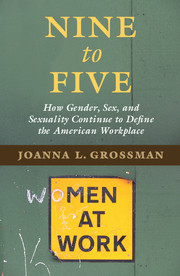Book contents
- Frontmatter
- Dedication
- Contents
- Foreword
- Acknowledgments
- Introduction
- PART I WHAT IS SEX DISCRIMINATION?
- PART II SEXUAL HARASSMENT
- 12 Workplace Affairs and Sexual Favoritism
- 13 Lolita at the Office
- 14 Sex Talk in the Writers’ Room
- 15 Sex Behind Bars
- 16 When the Supervisor Bullies Only Women
- 17 The Equal Opportunity Harasser
- 18 Periodontal Perils
- 19 Punishing Effeminacy
- 20 Late-Night Affairs with David Letterman
- 21 Why Herman Cain Has Not Been Able to Talk His Way Out of His Exploding Sexual Harassment Scandal
- 22 Why Hostile Environment Harassment Is a “Continuing Violation”
- 23 When Sexual Extortion Is Successful
- 24 The Consequences of Failing to Complain about Harassment
- 25 Who Is Responsible for Sudden, Severe Harassment?
- 26 Chinks in the Harassment Law Armor
- 27 Do Employer Efforts Prevent Harassment or Just Prevent Liability?
- 28 Who's the Boss?
- 29 Costly Mistakes
- 30 Hands Off the Merchandise
- PART III PREGNANT WOMEN AND MOTHERS AT WORK
- PART IV FEMALE BREADWINNERS AND THE GLASS CEILING
- Conclusion
- Notes
- Index
28 - Who's the Boss?
from PART II - SEXUAL HARASSMENT
Published online by Cambridge University Press: 05 May 2016
- Frontmatter
- Dedication
- Contents
- Foreword
- Acknowledgments
- Introduction
- PART I WHAT IS SEX DISCRIMINATION?
- PART II SEXUAL HARASSMENT
- 12 Workplace Affairs and Sexual Favoritism
- 13 Lolita at the Office
- 14 Sex Talk in the Writers’ Room
- 15 Sex Behind Bars
- 16 When the Supervisor Bullies Only Women
- 17 The Equal Opportunity Harasser
- 18 Periodontal Perils
- 19 Punishing Effeminacy
- 20 Late-Night Affairs with David Letterman
- 21 Why Herman Cain Has Not Been Able to Talk His Way Out of His Exploding Sexual Harassment Scandal
- 22 Why Hostile Environment Harassment Is a “Continuing Violation”
- 23 When Sexual Extortion Is Successful
- 24 The Consequences of Failing to Complain about Harassment
- 25 Who Is Responsible for Sudden, Severe Harassment?
- 26 Chinks in the Harassment Law Armor
- 27 Do Employer Efforts Prevent Harassment or Just Prevent Liability?
- 28 Who's the Boss?
- 29 Costly Mistakes
- 30 Hands Off the Merchandise
- PART III PREGNANT WOMEN AND MOTHERS AT WORK
- PART IV FEMALE BREADWINNERS AND THE GLASS CEILING
- Conclusion
- Notes
- Index
Summary
In Vance v. Ball State University, a divided Supreme Court held that a harasser does not qualify as a supervisor unless he or she has the power to “take tangible employment actions against the victim” – colloquially, the power to hire and fire. This matters because the employer's liability under Title VII for workplace harassment committed by supervisors is much stronger than it is for harassment inflicted by coworkers.
Writing for the majority, Justice Samuel Alito opted for a bright-line rule over one that might have provided redress for the harm that employees suffer at the hands of harassers who, despite not having the power to hire and fire, nonetheless dictate many or all aspects of employees’ daily working conditions.
THE FACTS IN VANCE V. BALL STATE UNIVERSITY
This case revolves around allegations by Maetta Vance, an African-American woman who worked at Ball State University (BSU), in its kitchen and catering department, that she was racially harassed. Vance began working at BSU in 2001, and she was, for many of the years she worked there, the only African-American employee.
While employed by BSU, Vance complained numerous times of racial discrimination and retaliation. Upon review by the Supreme Court, however, only her complaints involving one employee, Saundra Davis, were at issue. Davis is a white woman who worked as a catering specialist at BSU, while Vance worked as a catering assistant.
In internal complaints and charges with the EEOC, Vance alleged that Davis cornered her on an elevator in a threatening manner and told her, “I'll do it again.” And although Justice Alito leaves out these allegations in his description of the facts, Vance also alleged that Davis used the racial slurs “Buckwheat” and “Sambo” to refer to Vance, both in Vance's presence and outside of it. BSU did take some measures in response to Vance's complaints, but none was sufficient to resolve the problem.
According to the Supreme Court's opinion, the parties “vigorously dispute the precise nature and scope of Davis's duties, but they agree that Davis did not have the power to hire, fire, demote, promote, transfer, or discipline Vance.”
Vance eventually filed a lawsuit in federal court alleging that she suffered a racially hostile work environment in violation of Title VII. In her complaint, she alleged that Davis was her supervisor and was responsible for creation of the hostile environment.
- Type
- Chapter
- Information
- Nine to FiveHow Gender, Sex, and Sexuality Continue to Define the American Workplace, pp. 162 - 167Publisher: Cambridge University PressPrint publication year: 2016



